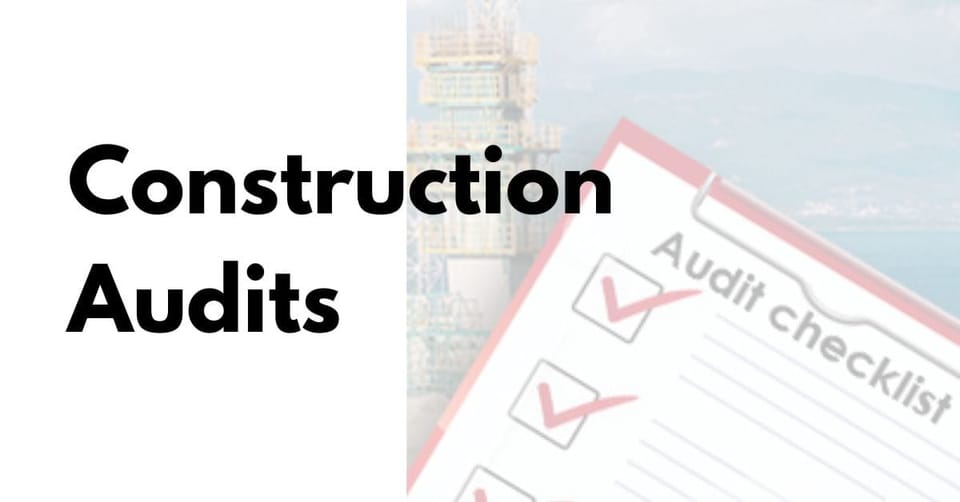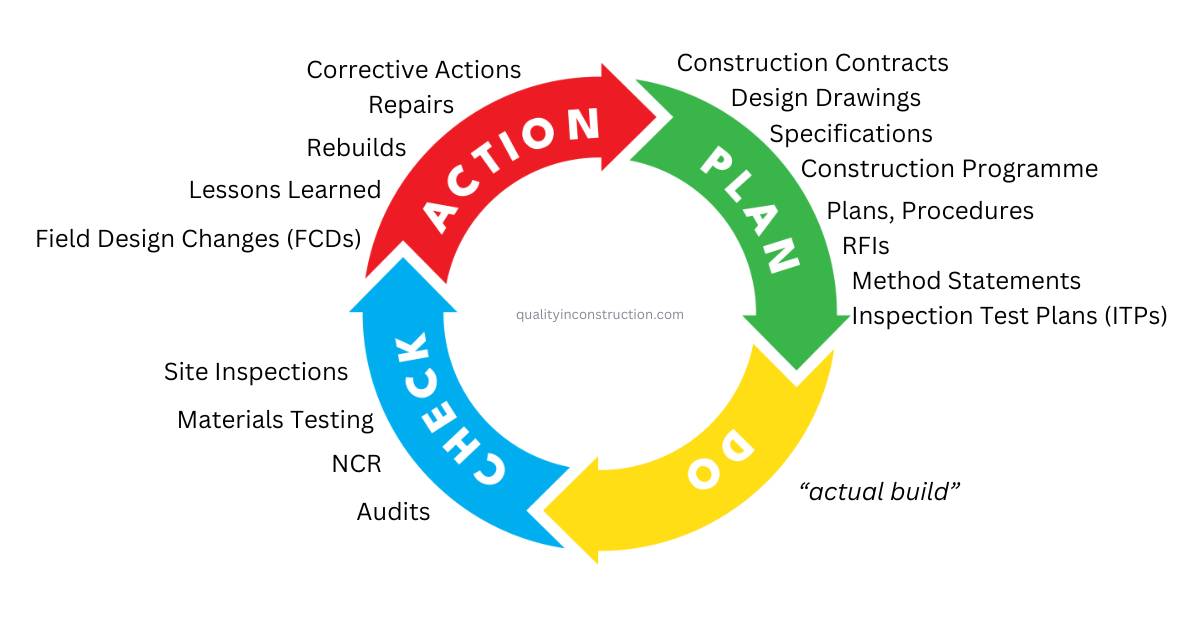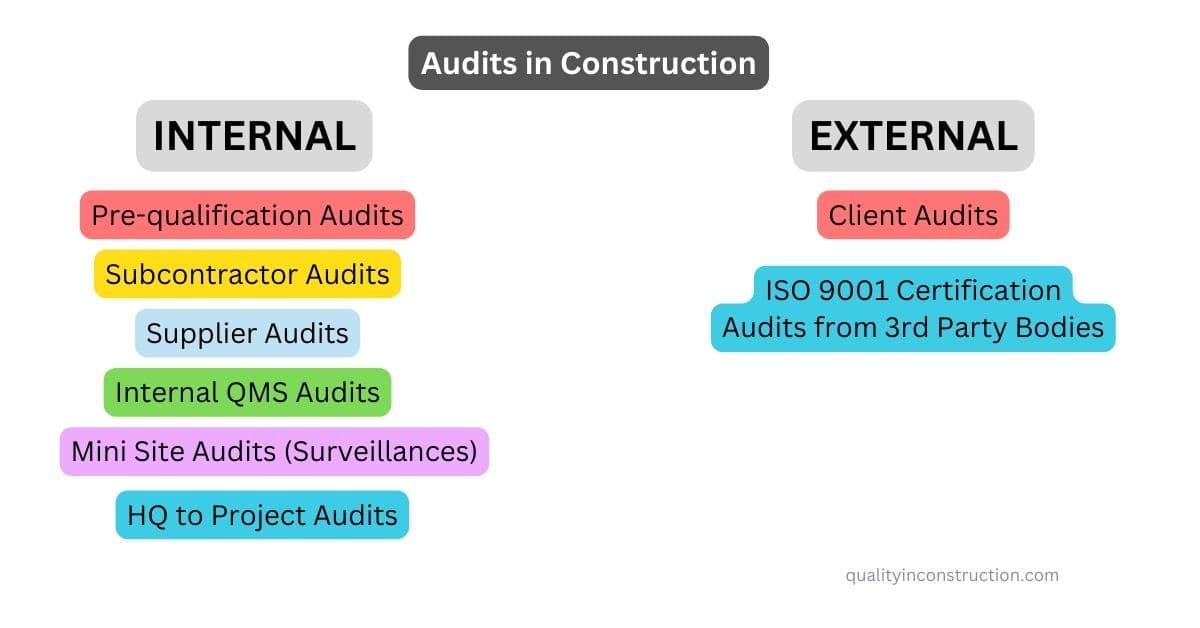7 Types of Construction Audits

Construction Internal Audits are an integral part of any Quality Management System (QMS) and a fundamental requirement of the ISO:9001 Standard. However, things can be quite different if the audit refers to the quality management system (QMS) of a project or of a construction company.
Carrying out Internal Audits is critical for the identification of any issues and to prevent nonconformities before they actually occur.

So, the different types of Construction Audits are:
1. Prequalification or Pre-selection Audits
These are internal audits that the organization or the Project is performing to assess the management system of a subcontractor or supplier (including Designers) before a contract is signed with them. Once such an audit has a successful outcome, then the subcontractor can then be considered for the specific works in the project and enter the tendering or bidding process.
2. Third-party audits for certification purposes
These audits are when a third-party accredited organization is invited (or “hired” basically) to audit a construction project or a construction company to provide the ISO:9001 Certificate (many times required by the Client). These are very strict and thorough audits that usually cover other standards, such as ISO 14001 (Environmental Management Systems) and ISO 45001 (Health and Safety Management Systems). These audits are usually carried out on an annual basis and are required to renew the ISO Certification.
3. Project Internal Construction Audits
These are the internal audits that are usually carried out by the quality personnel of the specific Project (Quality or QA/QC Department) and their aim is to scrutinize the internal processes that have been set up for this Project only. This category also includes Audits on Subcontractors, Designers and Suppliers of the project/company.
4. Internal Audits from the parent company
It’s not uncommon in construction industry, for the Quality Department of the parent company (Contractor or other) to audit a specific project team. These basically aim to monitor the performance of the project according to corporate procedures. These internal audits are also very common in Construction Joint Ventures, where each JV partner monitors the project’s system and performance.
5. Audits by the Client
These are Audits that are carried out by the Client or Client’s representatives in order to make sure that all contractual requirements regarding the quality management system of the Project are in place. Usually, during the Audit, the Contractor is represented by the Project’s Quality Department. The construction industry is unique in that regard because it is one of the industries where the “Customer” can perform audits during the production of the “Product”.
6. Mini internal Project Audits
These quick audits are also called “Surveillances” or “Works-Audits” and they are usually short audits from the Quality Department of a Project to ensure that the approved documentation (Method Statements, Inspection and Test Plan, Procedures etc) are followed on site. Sometimes, these are also performed as “Quality Tours or Walks”. It’s not uncommon for these ones to be performed (or witnessed) by the Client’s representatives as well.
7. Other Construction Audits
These are any other unplanned audits that don’t belong to the above categories. These are mainly unplanned audits that the management requests after an incident or a major NCR. These are useful for identifying the root causes of an issue or understanding trends that might be affecting a construction project or a company.

Apart from the unplanned Audits that might be requested occasionally, all of the rest should be well planned in advance through an agreed Audit Schedule. In many cases, the Audit Schedule of a Contractor has to be approved by the Client’s representative (it’s a requirement in many contracts).
Audits are one of the main tools for monitoring the performance of the Quality Management System of a construction project or a construction company, but they are overlooked sometimes.
There are cases where the audits are used by the management not as a proactive (or performance monitoring) measure but as an investigation tool when something is already wrong or (even worse) as a punishment tool when there are commercial or other disagreements with a supplier, a designer or a subcontractor.
Output of Construction Audits
The output of a construction internal audit is the Audit Report where the following points might have been identified:
- Nonconformities (NCRs) (Major or Minor)
- Observations
- Improvements
The definitions of the above might change depending on the system and the relevant procedure but the most important for the Auditor is always to provide objective and factual evidence on any finding (we can also probably add “Corrective and Preventive Actions” on the above list of audit outputs but these are more “actions after findings” rather than “findings”).
The Construction Audit Report
The final Construction Audit Report that is issued needs to be worded very carefully because important decisions are often made after an audit. It also needs to include all the important information and evidence.
Especially when the Audit is to a Subcontractor there might be many hidden surprises waiting during the audit, so the Auditor must be very well prepared in advance.
However, because we are talking about Construction industry here, the Auditor should always use common sense and consider carefully the implications of conformance or not to a (sometimes ambiguous or controversial) requirement.
Moreover, it is extremely important for the auditor to judge any case in direct comparison to what is happening in other similar cases within the project (very important while auditing subcontractors and Designers).
CONCLUSION
At the end of the day, the Auditor must be practical, flexible and always judging according to the associated risks because nobody on site should lose time with nonsense arguments that don’t really add any value to a Project.
I will never forget during my time in the Middle East where I audited a Concrete Batching Plant in the middle of the scorching desert. The plant was perfect in many ways with all the documentation in place.
The problem though was that those who worked in the plant were literally living in cabins in the plant in horrible condition next to aggregates.
You see…sometimes the quality of the concrete can be more important than the quality of life of real people.
Member discussion